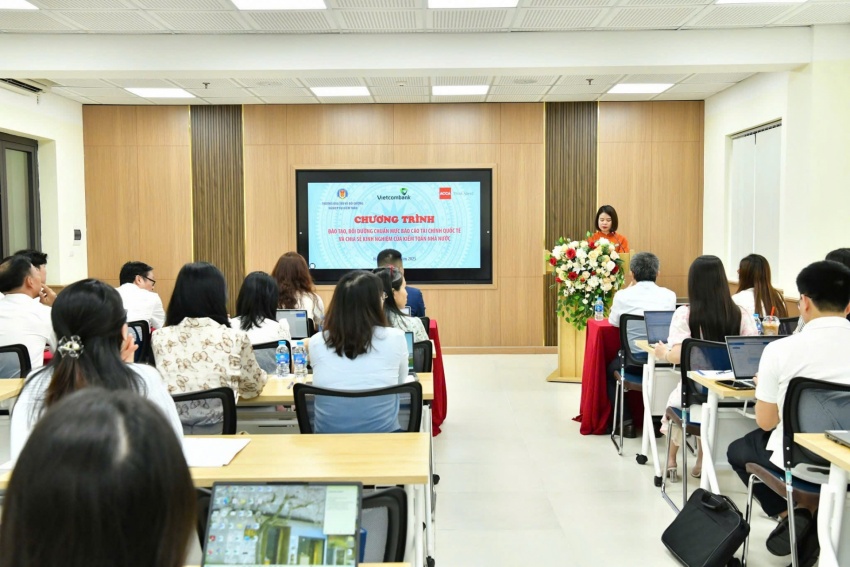This marks the first Vietnamese translation of such international standards, and it is expected to serve as a foundation for the local professional community to access, adopt, and integrate more rapidly with global practices. Experts emphasise that a high-quality, consistent translation is essential. Any deviation from the original IFRS concepts could lead to reports being rejected by international partners, banks, or auditors.
The terminology is therefore a practical tool for enterprises and regulators and a strategic step forward in Vietnam’s deeper integration with international norms.
 |
| ACCA Vietnam and experts introduced the first Vietnamese translation of sustainability reporting standards terminology. Photo: ACCA Vietnam |
To Quoc Hung, country manager of ACCA Vietnam, underlined that in the era of green transition and financial transparency, IFRS S1 and S2 are becoming guiding references for businesses and policymakers. Yet, the language barrier remains a significant challenge. To overcome this, ACCA Vietnam worked with experts to produce the country’s first Vietnamese terminology of sustainability reporting standards.
“Localising international standards into Vietnamese helps businesses interpret and apply new concepts correctly, and lays the groundwork for long-term sustainability strategies,” Hung stressed. “This support is particularly important for small- and medium-sized enterprises, which make up 97 per cent of Vietnam’s business community, as they face mounting pressure to disclose transparent information comparable with global standards.”
From an implementation perspective, Pham Quoc Hung, ACCA member, vice-chairman of ACCA Members’ Advisory Committee, deputy general director of Grant Thornton Vietnam, and head of the translation board, warned that a lack of consistency could easily result in misinterpretation and misapplication, distorting the preparation and presentation of reports.
He explained that translation in this field goes beyond linguistic conversion to become a process of concept transfer requiring professional, legal, and international expertise. “Our guiding principle was that the translation must be accurate in meaning and also consistent and aligned with the legal framework and professional documents already in use in Vietnam. Every term was carefully weighed to balance scientific rigour with accessibility for practitioners,” he noted.
Sharing the same view, Lang Trinh Mai Huong, ACCA member and deputy director-general of the Department of International Cooperation at the State Audit Office of Vietnam, emphasised that a standardised terminology is a prerequisite for ensuring that business disclosures are globally aligned and verifiable in Vietnam.
“When reviewing, we particularly focused on three aspects: accuracy, consistency, and usability,” Huong explained. “I also examined international trends, especially how supreme audit institutions and accounting associations worldwide are translating and applying sustainability terminology. This ensures our terminology is not isolated but part of the global knowledge flow.”
She added that the terminology could become an important tool for accelerating Vietnam’s integration in financial and sustainability reporting, while supporting the nation’s commitment to achieve net-zero emissions by 2050.
 |
|
ACCA and the State Audit Office of Vietnam provided IFRS training to Vietcombank staff in May. Photo: ACCA Vietnam |
In education, ACCA member To Vi Hung, a judge of the Sustainability Reporting Awards (SRA) for listed companies, expected that the terminology will soon be adopted as an official reference in both academia and practice. Listed firms and large corporations could use it to align with international reporting practices, while universities would have a solid basis to integrate it into curricula, enabling students to learn the language of IFRS from an early stage.
From the consultancy sector, Truong Hanh Linh, ACCA member and head of sustainability advisory services at KPMG Vietnam, described the terminology as a vital foundation enabling Vietnamese businesses to be more proactive in applying IFRS and integrating globally. “Accessing standards in a familiar language will allow businesses to move faster, save costs and time in the transition, and avoid the risks of misunderstanding or misapplication,” she said.
For over two decades, ACCA has supported professional development in Vietnam, and this translation project reaffirms its commitment. The IFRS terminology is expected to help the professional community adopt international standards more precisely and consistently, enhance reporting quality, promote transparency, and underpin the sustainability agenda.
Globally, ACCA has long been recognised as a pioneer in advancing the standardisation of financial reporting. It was among the first to integrate IFRS into its training and examinations, while maintaining close collaboration with the IFRS Foundation and the International Accounting Standards Board to ensure timely updates and the wide dissemination of new standards to the global accounting and finance community.





